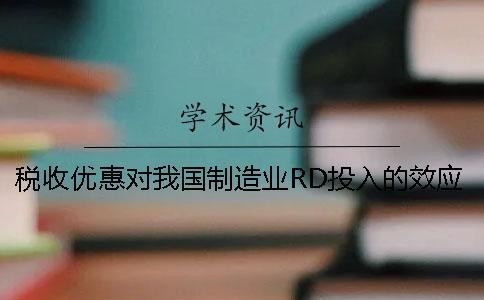
如何利用稅收優(yōu)惠政策促進(jìn)制造業(yè)企業(yè)對(duì)研發(fā)的投資?有非常重要的研究?jī)r(jià)值。國(guó)內(nèi)外學(xué)者已經(jīng)從多個(gè)角度對(duì)稅收優(yōu)惠影響了企業(yè)對(duì)研發(fā)的投資。進(jìn)行了理論分析和實(shí)證研究。海外的相關(guān)研究是初步的,理論分析和研究方法有很大的參考價(jià)值,但是研究背景和我國(guó)的狀況有很大的差異,研究結(jié)果的參考價(jià)值是有限的。
我國(guó)的相關(guān)研究起步晚,理論政策分析和宏觀數(shù)據(jù)研究基本上都有,對(duì)于與具體行業(yè)不同規(guī)模的企業(yè)的實(shí)證研究很少。本文對(duì)制造業(yè)企業(yè)中的大企業(yè)、中型企業(yè)和小型企業(yè)進(jìn)行了比較研究,在已經(jīng)研究的基礎(chǔ)上對(duì)稅收優(yōu)惠和企業(yè)研發(fā)投入之間的關(guān)系做了更具體的分析。本文利用2017年中國(guó)上市制造業(yè)企業(yè)發(fā)展數(shù)據(jù),采用PSM即趨勢(shì)得分匹配法,研究稅收優(yōu)惠,研究我國(guó)制造業(yè)企業(yè)R&D(研究與開發(fā))投入的激勵(lì)效果,得出結(jié)論后提出相應(yīng)的政策建議好了。
首先介紹寫作研究的背景和意義,同時(shí)整理和總結(jié)國(guó)內(nèi)外學(xué)者們的研究文獻(xiàn),總結(jié)他們的結(jié)論和觀點(diǎn)。接著,說明本論文的研究方法和革新點(diǎn)。另外,寫文章的過程中問題和正文的研究不足。然后,介紹了稅金介入制造業(yè)R&D的理論基礎(chǔ)和作用機(jī)制。
分別從理論上說明了中國(guó)制造業(yè)企業(yè)R&D的投入與經(jīng)濟(jì)增長(zhǎng)的關(guān)系、稅收優(yōu)惠的理論基礎(chǔ)和實(shí)施效果。第二,在介紹我國(guó)制造業(yè)企業(yè)R&D的現(xiàn)狀投入的同時(shí),整理了我國(guó)R&D稅收優(yōu)惠政策的發(fā)展過程和我國(guó)制造業(yè)企業(yè)R&D稅收優(yōu)惠政策的現(xiàn)狀。
之后采用傾向得分法進(jìn)行實(shí)證分析,分析R&D稅收優(yōu)惠的激勵(lì)效果,以制造業(yè)上市企業(yè)的數(shù)據(jù)為樣本。回歸分析稅收優(yōu)惠政策對(duì)企業(yè)制造業(yè)R&D產(chǎn)生激勵(lì)效果。
最終得出結(jié)論提出政策建議,在經(jīng)濟(jì)學(xué)分析和數(shù)理分析的基礎(chǔ)上,提出鼓勵(lì)完善制造業(yè)企業(yè)R&D投入的稅收優(yōu)惠政策建議。關(guān)鍵詞:制造業(yè)企業(yè);稅收優(yōu)惠;R&D投入AbstractiAsChina’seconomyhasenteredaofnewnormal,thedeveloptmentoftherealeconomyBefficult,和theproblemofmanfacturingingstrybistringproventings。wemastachievethetransformationandupgradingofmanfacturingindustry,andenhancetheindependentinnovationcapabilityofChina’smanfacturingenterprinses.AstheimportmentmeansforgovernmentcontroltheprotromodemonttaxationpoliciescanstimulatetheenterprinsestocarryoutR&D.Itisofgreatvaluetorererererchhowtousegovernment'ssubsidypoliciestaxpreferentialpoliciesandothertaxationpoliciespoliciespoliciespoliciespoliciesandpoliciespolitaxationpoliciespoliciespolitashpolitashpolitashpolitaxationpolitashpolitashpoliciesinvestment.domesticandforeignscholarshaveconductedtheorticalanlysisandemppiricalreearchontheimpactoftaxincentivesonenterprinses'R&Dinvestmentfromdifferentperspectives.Foreignrelatedtheoreaticalanlysisandrerererererchmethodsaryvaluable,becasetheystartedearlier.Bures。thereforethereferencevalueoftheirrerererererchrealthislimited.China’srelatedrelatte,andmostofthererererererererererererererererererererererererererererererererererererererererererererererererererererererererererererererererererererererererererererererererererererererererererererererererererererererererererererererererererererererererererererererererererererererererererererererescscscscscscscscscscscscscaaaaststststininininininininininininininininininininininininininininininistingreearches,thispaperalsomakesamoredetailedanlysisoftherelationshipbetweentaxincentivesandenterpress'R&Dinvestment.Based無壓力Methodsofdomestic和foreignscholarsandthedevelopmentdataofChineselistedmanfacturingenterpressin2017、thispaperstudiestheincentiveoftaxincentivesonR&DinvestmentofChinesemanfacturingenterprinsesbyusingPSM,i.e.propensityscorematchingmethod,andputforwardrecordingposigspolicthersons。drawn.Thispaperfirstintroducesthererereearchbackgroundandsignificanceofwriting、thethesametimemecobsandsummarzsthererererererererererererererererererererererererererererererererererererererererererererererereathofscholalarsabomeandaabobobobos、andaaboroad、and、andsusuwellthethethetheaaaaaaathethethethethethethetherereinininininininininininininininininininininininininininininininininininininininininstststststststststininininininininininininininininininininininbasisandmechangeismoftaxinterventioninmanfacturingR&D.ItexplinstherelationsbetweenR&Dinvestmentandeconomicgrowth,thethetheorticalbasisoftaxpreferenceandtheeffectofimplement.Secondly,whileinducturethealsointrtrouducesthedevelopmentprocessofR&DtaxpreferentialpoliciesandthestatusofR&Dtaxpreferentipoliciesofmanfacturinininininininininininininininininininininininininininininininininininininininininininininininininininininininininininininininininininininininininininininininininininininininininininininininininininininininininininininininininininininininininininininininininininininininles.RegressionanalsisofincentiveeffectoftaxpreferentialpoliciesonR&Dinvestmentinmanufacturingindustry.Finally,itdrawsconclosionsandputforwardpolicysuggatitions.Onthebasisofeconomicanlisisandmationsandmationicmations,atmations。itputsforwardtaxpreferentionstoimprovetheincentiveformanfacturingenterprinsestoinvestinR&Keyworrs:ManufacturingEnterpriss;TaxPreference;R&DInput1、導(dǎo)論1.1研究的背景和意義1.1.1研究的背景工業(yè)的發(fā)展是其他產(chǎn)業(yè)發(fā)展的先決條件,制造業(yè)是國(guó)家工業(yè)的主導(dǎo)力在國(guó)民經(jīng)濟(jì)中發(fā)揮著重要作用。我國(guó)現(xiàn)在是僅次于美國(guó)的世界第二工業(yè)制造國(guó),中國(guó)以巨大的制造業(yè)總量名符其實(shí)地成為“世界工廠”。
我國(guó)制造業(yè)在取得巨大成績(jī)的同時(shí),也面臨著許多需要解決的問題。我國(guó)迫切希望從“制造業(yè)大國(guó)”向“制造業(yè)強(qiáng)國(guó)”轉(zhuǎn)變,實(shí)現(xiàn)制造業(yè)產(chǎn)業(yè)升級(jí)。發(fā)達(dá)國(guó)家的長(zhǎng)期發(fā)展不斷源于創(chuàng)新,我國(guó)由于勞動(dòng)力成本低,所以我國(guó)的制造業(yè)主要是勞動(dòng)密集型產(chǎn)業(yè),技術(shù)含量低,主要從事流水線的工作。但是,隨著近幾年中國(guó)勞動(dòng)力成本的上升,中國(guó)制造業(yè)需要探索新的道路。國(guó)務(wù)院提出“大眾創(chuàng)業(yè)、萬眾創(chuàng)新”的口號(hào),指出經(jīng)濟(jì)發(fā)展要進(jìn)入新的常態(tài),需要從要素驅(qū)動(dòng)、投資驅(qū)動(dòng)轉(zhuǎn)向創(chuàng)新驅(qū)動(dòng)。這要求增加制造業(yè)研究開發(fā)的支出,支持制造業(yè)的研究開發(fā)活動(dòng)。
2015年5月19日,我國(guó)正式發(fā)布了“中國(guó)制造2025”的綱領(lǐng)。中國(guó)制造2025是我國(guó)政府實(shí)施強(qiáng)國(guó)戰(zhàn)略前10年的行動(dòng)綱領(lǐng)。“中國(guó)制造2025”堅(jiān)持“創(chuàng)新驅(qū)動(dòng)、質(zhì)量先、綠色發(fā)展、結(jié)構(gòu)優(yōu)化、人才為本”的基本方針,堅(jiān)持“市場(chǎng)主導(dǎo)、政府引導(dǎo)、立足當(dāng)前、立足長(zhǎng)遠(yuǎn)目標(biāo)、全面推進(jìn)、重點(diǎn)突破、自主發(fā)展、開放合作”的基本原則,堅(jiān)持“三步一步””實(shí)現(xiàn)建立強(qiáng)國(guó)的戰(zhàn)略目標(biāo):第一步2025年成為制造強(qiáng)國(guó),第二步是2035年中國(guó)制造業(yè)整體達(dá)到世界制造強(qiáng)國(guó)陣營(yíng)的中等水平。要達(dá)成戰(zhàn)略強(qiáng)國(guó)的戰(zhàn)略目標(biāo),企業(yè)自身的發(fā)展是不容忽視的。更重要的是,政府出臺(tái)一系列政策來促進(jìn)企業(yè)對(duì)研發(fā)的投資,必須進(jìn)入正式制造強(qiáng)國(guó)的前列。
政府鼓勵(lì)企業(yè)的研發(fā)和投資有直接和間接兩種方法,直接激勵(lì)的方式主要是直接向企業(yè)提供財(cái)政補(bǔ)貼,間接激勵(lì)的方式主要是向企業(yè)提供一定程度的稅收優(yōu)惠,如加減、加減加快折舊及計(jì)算稅率的優(yōu)惠。企業(yè)的革新研究會(huì)帶來一定的外部效果,所以企業(yè)的革新成果不能被革新企業(yè)壟斷。如果出現(xiàn)新產(chǎn)品和技術(shù),其他企業(yè)一定會(huì)互相仿效。這是政府統(tǒng)一規(guī)定的。